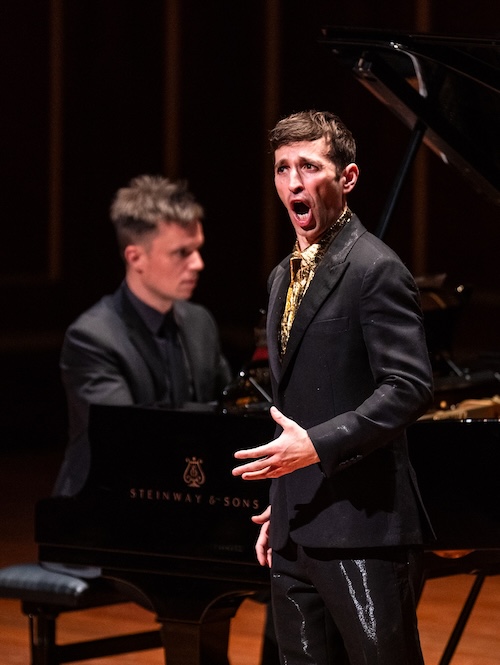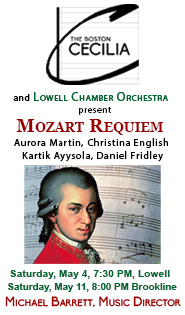Costanzo presents the art of the primo countertenor for the Celebrity Series

Anthony Roth Costanzo performed Friday night at Jordan Hall for the Celebrity Series. Photo: Robert Torres
Countertenor Anthony Roth Costanzo and pianist Bryan Wagorn delivered an illuminating recital in New England Conservatory’s Jordan Hall in Boston on Friday night, hosted by Celebrity Series of Boston. Costanzo’s performance of the program, which incorporated pieces written for countertenor and for female voice, pushed the limitations of the vocal medium of the male soprano, reimagining the role for the contemporary world.
Costanzo has rocketed to fame over the past decade, known in particular for his performance of the title role of Philip Glass’ critically acclaimed Akhenaten and his collaboration with cabaret artist Justin Vivian Bond. In his recital, Costanzo placed his identity as both a gay man and a countertenor in explicit conversation, as he voiced his commitment to exploring the potential of his vocal medium as an agent of both musical and social innovation.
The performance was enhanced by the superb work of accompanist Bryan Wagorn, an assistant conductor at the Metropolitan Opera. In a complex program that spanned four centuries and multiple genres, Wagorn’s accompaniment was in perfect step with Costanzo’s programmatic vision and experimental musicality.
Friday’s intimate program seemed geared towards helping the audience understand the place the countertenor voice held in history, the place it holds today, and how the voice might be understood in the future. Costanzo interspersed the serious musical interventions of the program with his cabaret-style anecdotes, which made the work accessible and human as the audience saw the place that each piece held in Costanzo’s musical vision and personal life.
Costanzo was most at home in three excerpts from Gabriella Lena Frank’s Songs of Cifar and the Sweet Sea—a song-cycle setting of the poetry of Nicaraguan poet Pablo Antonio Cuadra. The poems relate the adventures in love and life of Cifar, a sailor who navigates Lake Nicaragua. Here, the nuance of Costanzo’s interpretation, supported and enhanced by Wagorn’s sensitive accompaniment, were powerfully felt. Costanzo’s power and perfect control—his sounding fortissimos and delicate pianissimos, the seamless transitions between spoken and sung, his impeccable pitch—allowed the audience to lose themselves in the emotional progress of Frank’s work.
The first half of the program ended with “The Places We Leave,” commissioned by Costanzo from composer Joel Thompson and poet Tracy K Smith. The piece, a love song from one man to another, highlighted the program’s themes of the exploration of the nature of masculinity and its relationship with the male soprano. Costanzo delivered a moving performance that brought lyricism to the fragmented and often alienating experience of modern love.
While the first half of the evening’s program centered songs written for or about men, the second half of the program focused on Costanzo’s decision to sing songs associated with the great opera divas of the 20th century.
The songs by Verdi were the highlight of the evening; sweet and simple, Costanzo’s rendering of “Deh Pietoso, oh addolorato” and “Stornello” captured the passionate spirit of Italian song.
Less successful was the opening Vivaldi set, which established the place the male soprano held at the beginning of its history.
While Costanzo’s performances were pleasant enough,Vivaldi on a piano as opposed to a harpsichord seemed out of place. Also Costanzo seemed less comfortable in the Baroque idiom in his phrasing and ornamentation.
If Costanzo’s Verdi was the most beautiful performance of the evening, his Streisand set felt the most radical. As Costanzo took these songs—so personally meaningful to him—and rendered them for countertenor voice, one was reminded of the instrumental innovations of the early 20th century; the modification of the bassoon to accommodate the opening solo of Stravinsky’s Rite of Spring comes to mind. In songs like “My Man” and “He Touched Me,” Costanzo pushed his voice in terms of volume and idiom as he explored the complex and liberatory meaning these songs held for him as a gay man. To watch Costanzo perform these songs was to see the expansion of a musical medium in real time.
The encore was a masterstroke. Costanzo performed the role of both Susanna and the Count in the duet “Crudel, Perché finora,” from Mozart’s Marriage of Figaro. Dashing back and between roles, Costanzo and Wagorn made the audience laugh uproariously—an experience that recalled the raucous humor of the early days of opera. The “duet” was the consummate expression of versatility, putting a dazzling coda on the end of his program by performing multiple genders with equal fluidity.
The Celebrity Series presents a concert by Hélène Grimaud on January 20 at 8 p.m. at Jordan Hall. celebrityseries.org
Posted in Performances
